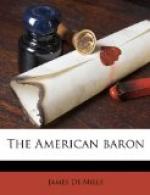Once or twice after this he called upon them. On the first occasion only Lady Dalrymple was visible. On the second, none of the ladies were at home. He was baffled, but not discouraged. Returning from his call, he met Minnie and Mrs. Willoughby. Hawbury was with them, riding beside Minnie. The ladies bowed, and Girasole, as before, coolly turned his horse and rode by the carriage, talking with Mrs. Willoughby, and trying to throw at Minnie what he intended to be impassioned glances. But Minnie would not look at him. Of course she was frightened as usual, and grew excited, and, as before, talked with unusual animation to Hawbury. Thus she overdid it altogether, and more than ever confirmed Girasole in the opinion that she and Hawbury were affianced.
Two days after this Girasole called again.
A bitter disappointment was in store for him.
They were not there—they had gone.
Eagerly he inquired where.
“To Rome,” was the reply.
[Illustration: “‘TO ROME!’ HE MUTTERED, BETWEEN HIS SET TEETH.”]
“To Rome!” he muttered, between his set teeth; and mounting his horse hurriedly, he rode away.
He was not one to be daunted. He had set a certain task before himself, and could not easily be turned aside. He thought bitterly of the ingratitude with which he had been treated. He brought before his mind the “stony British stare,” the supercilious smile, and the impertinent and insulting expression of Hawbury’s face as he sat on his saddle, with his chin up, stroking his whiskers, and surveyed him for the first time. All these things combined to stimulate the hate as well as the love of Girasole. He felt that he himself was not one who could be lightly dismissed, and determined that they should learn this.
CHAPTER XIII.
VAIN REMONSTRANCES.
Hawbury had immolated himself for as much as half a dozen times to gratify Dacres. He had sacrificed himself over and over upon the altar of friendship, and had allowed himself to be bored to death because Dacres so wished it. The whole number of his calls was in reality only about five or six; but that number, to one of his taste and temperament, seemed positively enormous, and represented an immense amount of human suffering.
One day, upon reaching his quarters, after one of these calls, he found Dacres there, making himself, as usual, very much at home.
“Well, my dear fellow,” said Hawbury, cheerfully, “how waves the flag now? Are you hauling it down, or are you standing to your guns? Toss over the cigars, and give an account of yourself.”
“Do you know any thing about law, Hawbury?” was Dacres’s answer.
“Law?”
“Yes.”
“No, not much. But what in the world makes you ask such a question as that? Law! No—not I.”
“Well, there’s a point that I should like to ask somebody about.”




